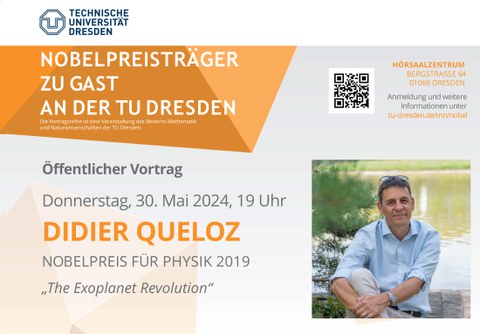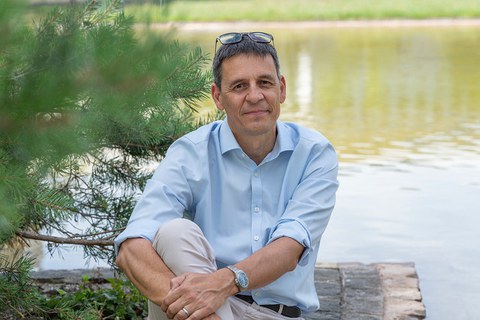May 27, 2024
Nobel Laureate lecture series
Exoplanets, the origin of life on Earth and signs of life outside our solar system: Swiss astronomer Didier Queloz was awarded the Nobel Prize in Physics in 2019 for the first discovery of a planet orbiting a sun-like star outside the solar system. On 30 May 2024, the 58-year-old outstanding scientist will give a public lecture entitled "The Exoplanet Revolution" in the Audimax of TU Dresden as part of the "Nobel Laureates as Guests at TU Dresden" series.
The lecture will be held in English. The event starts at 7 pm in the TU Dresden Audimax. Admission is free. Registration is requested at: tud.de/mn/nobel
About Didier Queloz:
Prof Didier Queloz, FRS, is Jacksonian Professor of Natural Philosophy at Cambridge Cavendish Laboratory and part-time professor of physics at ETH- Zurich.
He was born in Switzerland in 1966.
He is at the origin of the ‘exoplanet revolution’ in astrophysics when in 1995 during his PhD with his supervisor they announced the first discovery of a giant planet orbiting another star, outside the solar system. They received the 2019 Nobel Prize in Physics for this spectacular discovery that kick-started the rise of exoplanet researches.
Over the next 25 years, Didier Queloz scientific contributions have been to make progress in detection and measurement of exoplanet systems with the goal to retrieve information on their physical structure to better understand their formation and evolution and to compare with our Solar System. He participated and conducted various programs leading to the detection of hundred planets, include many breakthrough results.
More recently, his activity has focused on the detection of Earth like planets, establishing a comprehensive research program with the goal of making further progress in our understanding of habitability of exoplanets and life in the Universe. He is the funding director of the new Leverhulme Centre for Life in the Universe at Cambridge and of the new Centre for Origin and Life in the Universe at ETH-Z, Switzerland .
In addition to his research and teaching activities, he participates to numerous documentaries movies, articles TV and radio interviews to share excitement and to promote interest for science in general and particularly topics about exoplanets and life in the Universe.


